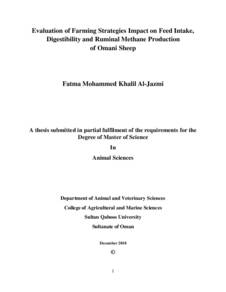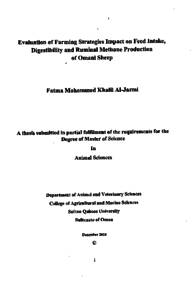Document
Evaluation of farming strategies impact on feed intake, digestibility and ruminal methane production of Omani sheep
Publisher
Sultan Qaboos University
Gregorian
2018
Language
English
Subject
English abstract
Sheep farming systems in the Sultanate of Oman similar to others in arid and semi-arid areas are facing challenges toward improving their performance. The major challenges are feeds availability, feed prices, and the high year-round ambient temperature. Furthermore, livestock environmental aspects remain a global and local challenge. The general goal of this work was to evaluate strategies for improving performance of Omani sheep. The specific objectives of this work were: 1) to evaluate the impact of diet concentrate and energy levels and animal shearing on feed and nutrient intakes and ruminal methane production of Omani sheep, 2) to measure the variations in feed intake, water intake, rectal temperature, and blood parameters between different groups of sheared and fleeced rams fed high- or low-quality diets. Two experiments were conducted to evaluate the effect of diet and shearing on nutrient and feed intake, water intake, rectal temperature, digestibility and ruminal methane production in Omani yearling rams. Our results showed that the dietary increase in concentrate level (60%:40%, concentrate to roughage ratio) has increased organic matter and nutrients intake of the total diet, water intake, and has reduced ruminal methane production compared to the low concentrate fed diets with (80%:20%, roughage to concentrate ratio). Furthermore, shearing has a significant effect on increasing organic matter intake, water intake and reducing the rectal temperature of animals. Most of the variation in water intake and ruminal methane production is driven by the diet effect.
Partial substitution of low-quality Rhodes grass by high quality concentrate has improved the total diet organic matter digestibility and nutrients digestibility and had no observed effects on biochemical blood parameters or animal health.
This study suggests that shearing of animals under shade and supplementing greater amounts of high energy feeds would lead to improving Omani sheep subsistence under hot climate conditions and mitigate their methane production.
Member of
Resource URL
Arabic abstract
قطاع تربية المواشي في سلطنة عمان , يواجه تحديات من حيث تحسين أداء الحيوان في المناطق القاحلة و شبه القاحلة. من أهم التحديات التي تواجه المريين هي توفر العلف يكميات و اقره و اسعار الاعلاف و حرارة الجو على مدار السنة. و تبقى الجوانب البيئيه عقبة و تحدي عالمي الهدف العام لهذه الرساله هو لقيم الاستراتيجيات التي تساهم في تحسين انتاج الخرفان العمانية الأهداف الخاصة 1) تقيم تأثير الغذاء (الأعلاف المركزه) و مستويات الطاقة و تير حلق صوف الحيوان على استهلاك الغذاء و العناصر الغذائيه و انتاج غاز الميثان في كرش الحيوان. 2) مقياس الاختلافات في استهلاك الغذاء و كمية المياه و حرارة الجسد و مؤشرات الدم ما بين مجموعات مختلفة في التجريه , بين الخراف التي تم جز صوفها و التي يتم تغذيتها وجبة عالية الجودة و منخفضة الجودة. تجريئين اقيمتا لتقيم تأثير الغذاء و جز الصوف على استهلاك الغذاء و عناصر التغذية تشير النتائج أن الزيادة في مستوى العلف المركز (60%-40% علف مرکز و حشائش "عشب الرودس") قد زادت المواد العضويه العناصر الغذائية المتناولة من النظام الغذائي الكلى , كمية المياه و خفضت انتاج غاز الميثان مقارنة بالوجبات الغذائية منخفضة الجودة المكونه من (80%-20% حشائش "عشب الرودس" و العلف المركز على التوالي. علاوة على ذلك فان جز صوف الحيوان له تأثير ملحوظ على زيادة العناصر العضوية كمية المياه و حرارة جسم الحيوان. معظم الاختلافات في كمية المياه و كمية التاج غاز الميثان في كرش الحيوان, كان المؤثر عليها هو النظام الغذائي. و قد ادى استبدال الجزئي للحشائش " عشب الرودس" بالأعلاف المركزه ذات الجودة العالية الى تحسين اجمالي هضم العناصر العضويه و هضم المواد الغذائيه و لكن لم يكن الاستبدال أي تأثير ملحوظ على مصل الدم او صحة الحيوان تشير هذة الدراسة الى أن جز صوف الحيوانات و ابقائها تحت الظل و اعطاء الحيوانات مكملات غذائية ذات مستويات طاقة عالية من شأنه أن يؤدي الى تحسين أداء الخرفان العمانية في ظروف المناخ الحار و التخفيف من انتاج غاز الميثان.
Category
Theses and Dissertations



